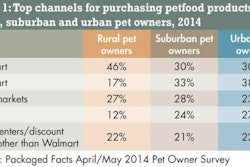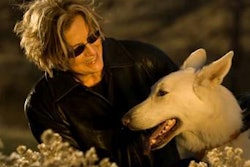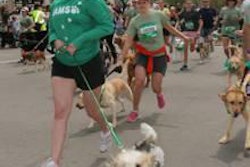The data on Brazil’s petfood market have been impressive for several years now. It’s the fastest growing pet market globally and is now the second largest petfood market (behind the US), according to Euromonitor. Petfood sales reached US$5.8 billion in 2012, a figure even Euromonitor hadn’t projected Brazil to hit until 2015. Now the research firm says Brazil owns 8% of the global pet market and will add more than US$2 billion in total pet care sales by 2017.
But it’s one thing to read statistics; it’s quite another to experience this dynamism and growth in person, as I was very fortunate to do last week. Abinpet, the Brazilian pet products association, generously invited several members of the international pet community to São Paulo to learn first-hand about the country’s pet market. (Other participants included Miguel Mendes de Leon of Pets International magazine and Daniel Barrantes and Anthony Arias of Imgevet, a Costa Rican pet product importer.)
Oh, and while we were there, a World Cup broke out! We were also very fortunate to attend the opening match of the World Cup, between the host country and Croatia, thus seeing first-hand the love of football and pride of country of thousands of Brazilians. Yes, there were protests; as one of our hosts told me, many people in Brazil believed the former president had duped them (intentionally or not) into believing that hosting the World Cup would bestow an economic boost to the country as well as its citizens. With the opposite seeming to occur – billions spent on stadiums and support with no direct financial gain – people are understandably upset.
Yet, we also witnessed many examples (and not just with fans at the opening match, but also people, businesses and residents throughout São Paulo) of sporting the national team’s colors and the country’s flag. Despite the protests and negative reactions – and the inevitable media hyper-focus on them – the prevailing attitude, at least in that city, seemed to be that, as long as the World Cup was there, they should take advantage of having the world’s attention and showcase their country and its many wonders.
That was certainly the approach of Abinpet, along with the government agency it partners with, Apex Brasil, which serves to develop, promote and grow Brazilian industries. For example, Martina Campos of Abinpet told me that since her organization started its Pet Brasil partnership with Apex in 2005, the Brazilian petfood market has grown more than 20%.
In conjunction with the World Cup, Apex organized and staged a program called Brasil Beyond Football to highlight the country’s economic strength and sectors, as well as help educate the world about them. Abinpet and many of the other 80+ industry organizations that partner with Apex participated in the program and organized their own sector-specific programs around it.
Abinpet’s program included presentations plus visits to six pet retail establishments throughout São Paulo (chauffeured by Francisco, aka Tarzan, who was very skilled at navigating the city’s notorious traffic). Thus, we learned interesting petfood-related facts such as:
- Brazil produces nearly 200 million tons of grains annually, which aids the production of high-quality petfoods at a good price.
- The overall pet market is 31% of GDP, sixth after textiles, machinery, beauty/personal care, telecom and electronics.
- Petfood comprises 53% of that pet market, and more people are buying petfood online, especially dog food, which has become like a commodity.
- Yet, a little over 50% of pets in Brazil still eat human food and table scraps. This is quickly declining as pets are being converted to commercial petfood; it's a top campaign among petfood manufacturers.
- There are 118,705 formal pet organizations in Brazil, dominated by the distribution chain with 110,000: wholesalers (based on price only, offering no services), plus distributors (who provide full services, too, especially for petfood).
- Industries (manufacturers) are only 1%, numbering 872. Of those, 182 are petfood companies. Some are multinationals (Purina, Royal Canin, Mars, Hill's), but many are Brazilian owned and based.
- The Brazilian pet market employs nearly 445,000 million people, with over 50% involved in grooming. Most groomers are certified. Veterinarians make up 7% of the market, trainers 6% and store employees 5%.
- There’s a pet retail pyramid: at the bottom, pet shops (small, one to three employees) are highest in number but offer only 30% of products available in country. Medium size pet stores (five to seven employees) offer 50% of products and often have grooming areas and formal veterinary services (they might even be owned by vets). Regional mega stores offer 75% of products. National mega stores offer a 100% mix, while pet hospitals (fewest in number, topping the pyramid) offer 50%.
- There are only two national mega pet store chains, and they don't cover the entire country, just six to eight states: Cobasi and Pet Center Marginal. These stores offer prescription petfoods (though they don’t steer consumers to them unless a shopper has a veterinary prescription in hand, a store manager explained to me) along with many other types of petfood products, from multinationals as well as domestic brands.
- Both mega stores also regularly have representatives from the larger petfood companies on site to talk with consumers. At Cobasi, I talked with a Purina representative who told me she has a veterinary degree and travels around to several stores throughout the month; at Pet Center Marginal, I saw reps for Royal Canin and Brazilian manufacturers Farmina and Premier Pet.
- Both Cobasi and Pet Center Marginal have their own pharmacies in stores. Both also have large grooming areas and veterinary clinics; at Cobasi, these spaces are rented by the groomers and vets, respectively, who are not store employees, while at Pet Center Marginal they are employees and the areas are fully owned by the store. (The vet clinics there are open 24/7.)
- Marginal also features a large area with puppies and kittens for sale, prominently sponsored by Royal Canin (including a computer kiosk featuring the manufacturer’s breed-specific dog diets), along with a Pet Safari area with an extensive assortment of fish, pet birds and small mammals. Cobasi has a small area with a few fish, pet bird breeds and small mammal species.
- Interestingly, small pet shops, especially in rural areas, buy from the national mega stores to offer specific products to customers – for example, prescription or specialty petfoods.
We also visited two manufacturers in Campinas, Brazil: Vetnil, makers of pet supplements and nutraceuticals, and Guabi, a feed and petfood manufacturer. Last year Affinity Petcare in Spain announced it was taking a 50% stake in Mogiana, Guabi’s petfood division; the day we visited the Guabi facility (its dry petfood plant, it also has a wet petfood plant elsewhere), a company representative alluded to a very recent announcement about that deal but was unable to share more information at the time. Please stay tuned for that, as well as a report coming soon about Guabi and its petfood plant.
















